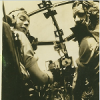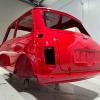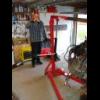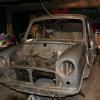Sounds like you are at the stage where you have removed most of the rust using the tools you have at your disposal, what's left can be removed by applying a rust remover (not a rust converter) I use Bilt Hambers Deox Gel. I find the process very labour and time consuming but the end result is well worth it, most will tell you to follow the instructions to the letter though I must admit I do deviate from them a bit.
Apply/spread it on as per the instructions then cover with cling film to stop it drying out, I then leave it alone for 24 hours once this period has passed I then get to work on it using a small hand held wire brush (tooth brush size) you can see that it is working as the Deox Gel will turn from a light beige colour to a rusty brown, once I'm happy I have vigorously brushed the whole area I cover it again with cling film as even though its dirty and now contaminated the solution will carry on doing its job then repeat the wire brushing process again.
The only downside to using the product is that soapy water has to be used to remove it, this can be a pain especially when using it close to seams so once its all off I dry the area immediately with a heat gun, whatever you do don't let the solution dry out as its almost impossible to remove without using water or a wire brush, white spirit or cellulose thinner wont touch it once its dry.
The tools you are using at present are probably no different to what most others use, I have found that in confined spaces a powerfile can be useful for removing scale as you only need to apply it very lightly you don't want to be removing good metal (Cannot stress that enough) the action of the moving belt does all the work for you. As for wire wheels I find the best ones are those that cut on their circumference/outside diameter the sizes I use are 2" and 3" they out last all the others and are more effective for longer especially if used at a slow speed and not flat out.


















